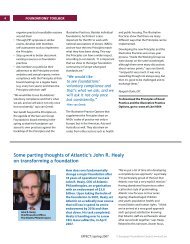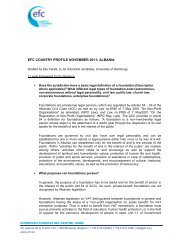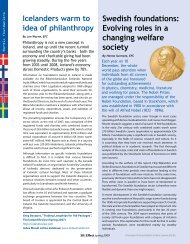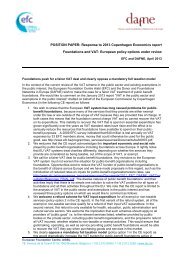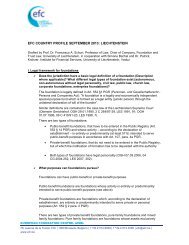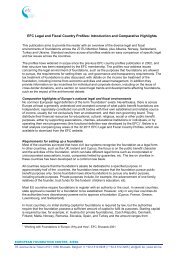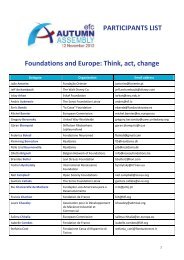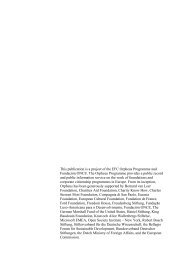European perspectives on global health: a policy glossary
European perspectives on global health: a policy glossary
European perspectives on global health: a policy glossary
Create successful ePaper yourself
Turn your PDF publications into a flip-book with our unique Google optimized e-Paper software.
1. Europe must make <strong>global</strong> <strong>health</strong> a priority<br />
Globalisati<strong>on</strong> has a profound<br />
impact up<strong>on</strong> <strong>health</strong><br />
“Globalisati<strong>on</strong> can be defined as the<br />
“widening, deepening and speeding up of<br />
worldwide interc<strong>on</strong>nectedness in all aspects of<br />
c<strong>on</strong>temporary social life”. ( Held, et al 1999 )<br />
“Although resp<strong>on</strong>sibilities for <strong>health</strong> remain<br />
primarily nati<strong>on</strong>al, the determinants of <strong>health</strong><br />
and the means to fulfil that resp<strong>on</strong>sibility are<br />
increasingly <strong>global</strong>.” ( Jamis<strong>on</strong>, et al 1998 )<br />
The relati<strong>on</strong>ship between <strong>global</strong>isati<strong>on</strong> and <strong>health</strong><br />
is a two-way process. There are many direct and<br />
indirect ways in which <strong>global</strong>isati<strong>on</strong> affects <strong>health</strong>.<br />
The inverse is also true : a society which suffers<br />
from a high burden of disease is not in a positi<strong>on</strong> to<br />
participate effectively in the processes of <strong>global</strong>isati<strong>on</strong><br />
and therefore will not be able to share its benefits.<br />
And a <strong>global</strong> disease outbreak can lead to significant<br />
human and financial losses all around the world. The<br />
interface between <strong>global</strong>isati<strong>on</strong> and <strong>health</strong> has all the<br />
ingredients of a vicious spiral, but also the potential<br />
for a virtuous circle. Europe is both affected by and<br />
c<strong>on</strong>tributes to this in manifold ways :<br />
• Globalisati<strong>on</strong> leads to more rapid spread of<br />
<strong>health</strong> problems, as a c<strong>on</strong>sequence of increasing<br />
worldwide travel ( infectious diseases ) as well as<br />
through the spread of c<strong>on</strong>sumpti<strong>on</strong> habits through<br />
<strong>global</strong> marketing ( smoking, changing patterns<br />
of food c<strong>on</strong>sumpti<strong>on</strong> ). Lack of c<strong>on</strong>trol of <strong>global</strong><br />
disease spread can lead to a range of negative<br />
impacts in both rich and poor countries as the<br />
SARS epidemic and spread of obesity show.<br />
• Globalisati<strong>on</strong> has helped to increase scientific<br />
and technological knowledge sharing for the<br />
development of medicines, vaccines and medical<br />
appliances, which allows new forms of treatment<br />
and preventi<strong>on</strong> to develop. It has also improved<br />
communicati<strong>on</strong> and transport possibilities and<br />
thus reduced the technical barriers to access<br />
to medical informati<strong>on</strong> and treatment. Internet<br />
communicati<strong>on</strong> has also drastically improved the<br />
possibility of tracking and m<strong>on</strong>itoring outbreaks of<br />
infectious diseases.<br />
• Access to medical progress has been more<br />
unequal ; as the <strong>health</strong> sector has c<strong>on</strong>tinued<br />
to grow in developed countries, the ec<strong>on</strong>omic<br />
restricti<strong>on</strong>s for the <strong>health</strong> sector in many poor<br />
countries has increased. Reas<strong>on</strong>s include :<br />
pressures <strong>on</strong> public expenditures, sometimes<br />
due to c<strong>on</strong>diti<strong>on</strong>s imposed <strong>on</strong> structural<br />
adjustment loans, increasing prices for newly<br />
developed medical inputs due to more stringent<br />
internati<strong>on</strong>al property rights rules, low research<br />
and development ( R&D ) expenditures <strong>on</strong> many<br />
tropical diseases, d<strong>on</strong>or focus <strong>on</strong> disease-specific<br />
programmes and lack of priority assigned by some<br />
of the countries themselves. Many poor countries<br />
also find it increasingly difficult to retain medical<br />
staff who are attracted by higher salaries in rich<br />
countries.<br />
• The rapid increase in <strong>global</strong> interc<strong>on</strong>nectedness<br />
has also transformed the face of internati<strong>on</strong>al<br />
politics. The growing percepti<strong>on</strong> of security risks<br />
for high-income countries due to <strong>health</strong>, but also<br />
the increasing strength of advocacy organisati<strong>on</strong>s<br />
in this field and the more active role taken by<br />
developing countries in internati<strong>on</strong>al fora and<br />
negotiati<strong>on</strong>s related to <strong>health</strong> has changed the<br />
field of internati<strong>on</strong>al cooperati<strong>on</strong> in <strong>health</strong>. Many<br />
new instituti<strong>on</strong>s have entered the field and the<br />
roles of traditi<strong>on</strong>al instituti<strong>on</strong>s have changed.<br />
• Private actors have rapidly gained importance<br />
as <strong>health</strong> becomes a major <strong>global</strong> market.<br />
Powerful companies and other private for-profit<br />
actors try to defend their strategic positi<strong>on</strong> in<br />
a liberalised <strong>global</strong> trade system ; this includes<br />
food, pharmaceuticals, agricultural products,<br />
insurance companies. Global civil society in turn<br />
has c<strong>on</strong>siderably strengthened its advocacy role<br />
and is increasing the pressure <strong>on</strong> private business<br />
to accept corporate social resp<strong>on</strong>sibility for <strong>global</strong><br />
<strong>health</strong>.<br />
Acti<strong>on</strong> : “Making <strong>global</strong>isati<strong>on</strong> work for every<strong>on</strong>e’s<br />
<strong>health</strong>” should be at the core of a <str<strong>on</strong>g>European</str<strong>on</strong>g> strategy<br />
for <strong>global</strong> <strong>health</strong>.<br />
14 <str<strong>on</strong>g>European</str<strong>on</strong>g> Foundati<strong>on</strong> Centre – <str<strong>on</strong>g>European</str<strong>on</strong>g> Partnership for Global Health



